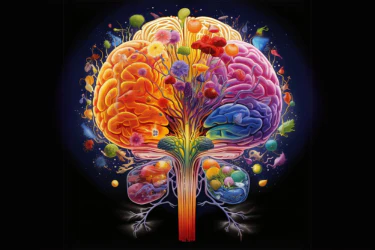The Role of Nutrition in Mental Health: Eating for a Happier Mind
When we think of maintaining good mental health, we often focus on things like therapy, mindfulness, or exercise. However, an often-overlooked factor in mental well-being is nutrition. What you eat can significantly impact your mood, cognitive function, and overall mental health. In fact, emerging research suggests that a nutrient-rich diet can play a vital role in improving mental clarity, emotional stability, and reducing the risk of mental health conditions like depression and anxiety. In this article, we explore the connection between nutrition and mental health and offer tips on how to eat for a happier mind.
The Connection Between Diet and Mental Health
Our brain requires a variety of nutrients to function at its best, including vitamins, minerals, healthy fats, proteins, and carbohydrates. A deficiency or imbalance of these nutrients can contribute to poor mental health. Similarly, consuming a diet rich in whole, nutrient-dense foods can enhance cognitive function, improve mood, and help prevent mental health disorders.
Here’s how specific nutrients and dietary habits influence mental health:
1. Omega-3 Fatty Acids: Building Blocks for Brain Health
What it does:
Omega-3 fatty acids are essential fats that play a key role in brain function and mental health. They are found in fatty fish like salmon, mackerel, and sardines, as well as in flaxseeds, walnuts, and chia seeds. Omega-3s help build cell membranes in the brain and support communication between brain cells. Low levels of omega-3s have been linked to conditions like depression, anxiety, and cognitive decline.
How to include it:
Incorporate more omega-3-rich foods into your diet by eating fatty fish at least twice a week, snacking on nuts and seeds, or adding flaxseed or chia seeds to smoothies, salads, or yogurt.
2. B Vitamins: Essential for Brain Function and Mood Regulation
What they do:
B vitamins, particularly B6, B12, and folate, are crucial for mental health. They help the brain produce neurotransmitters like serotonin and dopamine, which regulate mood, energy, and sleep. Deficiencies in B vitamins have been associated with mood disorders, including depression and anxiety.
How to include them:
To ensure adequate intake of B vitamins, focus on foods like whole grains, leafy greens, beans, eggs, poultry, fish, and fortified cereals. If you suspect a deficiency, your healthcare provider might recommend a supplement.
3. Vitamin D: The Sunshine Vitamin for Your Mind
What it does:
Vitamin D is essential for brain health and the regulation of mood. Low levels of vitamin D have been linked to an increased risk of depression and seasonal affective disorder (SAD). The body produces vitamin D when exposed to sunlight, but many people are deficient, especially in winter months or if they spend a lot of time indoors.
How to include it:
Increase your vitamin D intake by consuming foods like fortified dairy products, eggs, fatty fish, and mushrooms. If necessary, you may also want to consider a vitamin D supplement, especially in areas with limited sunlight.
4. Magnesium: A Calming Mineral
What it does:
Magnesium is a mineral that plays a vital role in the nervous system and brain function. It helps regulate neurotransmitters, which influence mood and stress levels. Magnesium has been shown to have a calming effect and can help reduce symptoms of anxiety, stress, and even depression.
How to include it:
Magnesium is found in foods such as spinach, almonds, pumpkin seeds, black beans, and whole grains. Aim to include magnesium-rich foods regularly in your meals to support mental health.
5. Antioxidants: Protecting the Brain from Oxidative Stress
What they do:
Antioxidants, such as vitamins C and E, protect the brain from oxidative stress caused by free radicals. This oxidative stress can contribute to cognitive decline and conditions like depression. A diet rich in antioxidants can help improve mental clarity, mood, and protect the brain from age-related diseases.
How to include them:
Fruits and vegetables, particularly berries (like blueberries, strawberries, and blackberries), leafy greens, and nuts, are all rich in antioxidants. The more colorful your plate, the better!
6. Protein: Fuel for Your Brain
What it does:
Protein provides the amino acids needed to create neurotransmitters like serotonin, which is often referred to as the “feel-good” hormone. A diet that lacks adequate protein can lead to irritability, mood swings, and poor cognitive function. Protein helps maintain stable blood sugar levels, preventing mood crashes and energy slumps.
How to include it:
Include a variety of protein sources in your diet, such as lean meats, fish, eggs, beans, legumes, tofu, and quinoa. Aim for balanced meals with a good amount of protein to keep energy levels stable throughout the day.
7. Complex Carbohydrates: Regulating Mood and Energy
What they do:
Carbohydrates provide energy for the brain, but it’s important to focus on complex carbohydrates rather than refined sugars. Complex carbs release glucose slowly into the bloodstream, providing steady energy. Refined sugars, on the other hand, can cause blood sugar spikes and crashes, leading to mood swings and irritability. A diet rich in whole grains, fruits, and vegetables supports balanced energy levels and stable mood.
How to include them:
Choose whole grains like brown rice, oats, quinoa, and whole-wheat bread over processed, refined carbs. Include a variety of fruits and vegetables to increase your intake of complex carbohydrates, fiber, and other essential nutrients.
The Gut-Brain Connection: Nourishing Your Gut for Better Mental Health
Emerging research has also highlighted the importance of gut health in maintaining good mental health. The gut is often referred to as the “second brain” due to its extensive network of nerve cells and its role in producing neurotransmitters like serotonin. An imbalance in gut bacteria, also known as dysbiosis, has been linked to mental health conditions such as anxiety and depression.
How to improve gut health:
- Probiotics: Incorporate fermented foods such as yogurt, kefir, kimchi, and sauerkraut into your diet to promote healthy gut bacteria.
- Prebiotics: Foods like garlic, onions, bananas, and asparagus feed beneficial gut bacteria and support digestion.
- Fiber: A diet rich in fiber from fruits, vegetables, and whole grains helps maintain healthy gut flora and supports overall digestive health.
Eating for a Happier Mind: Tips to Implement
- Avoid Processed Foods: Highly processed foods, fast foods, and sugary snacks can disrupt mood and energy levels. Focus on whole foods, which provide the necessary nutrients for brain function.
- Stay Hydrated: Dehydration can affect mood and cognitive performance. Aim to drink plenty of water throughout the day to support brain function.
- Practice Mindful Eating: Eating slowly and mindfully can improve digestion and help prevent overeating. It also allows you to focus on how food makes you feel, which can improve your relationship with food.
- Eat a Balanced, Varied Diet: Include a wide variety of nutrient-rich foods to ensure you get all the vitamins and minerals needed to support both physical and mental health.
Conclusion
The foods you eat play a crucial role in how you feel, think, and perform. A balanced, nutrient-rich diet can significantly improve mood, cognitive function, and overall mental well-being. By focusing on foods that support brain health—like omega-3 fatty acids, B vitamins, magnesium, and antioxidants—you can nourish your mind and foster a happier, healthier life. Remember, mental health and physical health are intertwined, and a holistic approach to both is key to long-term well-being.



